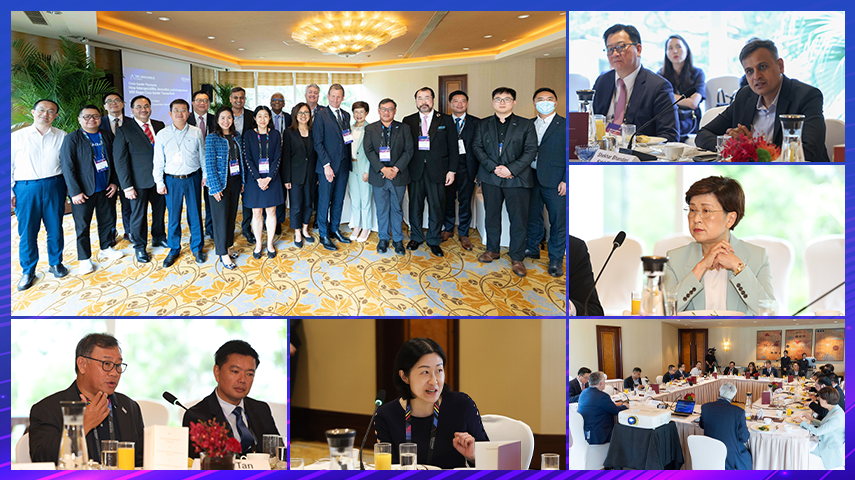
Interviewed By Chris Kapfer
At a recent roundtable hosted by The Asian Banker, industry experts from banks and financial institutions across Asia offered a comprehensive overview of the current challenges and potential solutions in cross-border payments.
The roundtable, held on 23 May in Hong Kong, centred around the deficiencies in current cross-border payment systems, specifically correspondent banking-based wire transfers via Swift. Issues such as opaqueness, inefficiencies causing long payment turnaround times, higher costs, and limitations beyond account-to-account transfers were highlighted.
The event was attended by senior representatives from Ant International, Philippine Bank of Communications (PBCOM), HSBC, China Construction Bank Asia, Kotak Mahindra Bank (India), Kasikornbank (Thailand), Netbank (Philippines), Baiduri Bank (Brunei), ANZ, Bangkok Bank, MB Bank (Vietnam), Bangkok Bank, China CITIC Bank International, VISA Direct, and VISA.
The roundtable was held during The Asian Banker Summit at the Conrad in Hong Kong and was hosted by Emmanuel Daniel, founder of The Asian Banker, Matt Dooley, international resource director for The Asian Banker, and Chris Holmes, UK House of Lords. Holmes was the keynote speaker at the annual summit, now in its 25th year.
Participants at the roundtable explored the benefits of alternative solutions like connecting with domestic real-time payments and fintech payment aggregation using application programming interfaces and virtual accounts.
Leveraging technology: The discussion emphasised the importance of leveraging technology to improve payment efficiency. Digital wallets and financial technology (fintech) solutions were recognised as key drivers.
Digital transformation has reduced costs and improved efficiency, and the discussion highlighted that financial inclusion has also improved with innovations such as digital payment wallets. However, participants concurred that while technology has enabled financial inclusion, inefficiencies in cross-border payments could be further minimised for potential gains in other areas.
Collaboration and integration: A major focus was the need for collaboration and the integration of real-time payment systems with cross-border transactions. While retail payments have seen significant improvements, extending these benefits to business-to-business transactions remains challenging due to regulatory concerns and the risk of fraud.
Participants agreed that improvements in cross border payments would materialise only with cooperation between technology companies, banks, and fintechs. For example, Visa is partnering with local banks to connect domestic real-time payment systems with international networks, enabling tourists to make instant payments to businesses.
Additionally, integrating financial services into digital wallets, as Ant International did with Alipay+, has digitalised processes, significantly reducing transaction times and costs while enhancing security and compliance. This is also supported by bilateral efforts to link fast payment systems across borders to enable instant, low-cost mobile transfers between the countries using just a recipient’s phone number, such as the initiative between PromptPay Thailand and PayNow in Singapore.
AML and fraud management: Based on the challenges and solutions of anti-money laundering compliance and fraud management in cross border payments, the roundtable agreed that robust regulatory frameworks are crucial to preventing fraudulent activities.
However, there was a consensus that fraud is an operational risk management issue rather than strictly a regulatory compliance issue. The conversation also touched on the need for more effective transaction monitoring and detection systems to combat fraud.
Super apps: The role of financial super apps in transforming the financial landscape was explored, with insights on leveraging artificial intelligence and ‘smart’ recommendations to enhance customer experience and drive financial inclusion.
The success of digital wallets, particularly in the Philippines, was highlighted as a model for integrating banking services with digital wallets to reach underbanked populations. Participants discussed how super apps like GCash have outperformed traditional banks by offering greater accessibility and convenience.
Infrastructure: Improving infrastructure to support faster cross-border payments and reducing costs were recurring themes. The high cost of currency conversion and limited transparency in fee structures pose significant obstacles. The discussion highlighted the importance of bilateral and multilateral agreements in facilitating smoother transactions and addressing regulatory compliance challenges.
The mechanisms of Renminbi clearing compared to traditional US Dollar clearing were discussed, with advanced systems facilitating almost instant cross-border transactions highlighted as a key advantage.
As the financial industry continues to innovate, critical areas highlighted were collaboration, regulatory support, and technological integration. The insights shared during this roundtable provided a roadmap for addressing pain points in cross-border payments, and fostering a more inclusive and efficient global financial system. The participants underscored the need for ongoing dialogue and cooperation to drive further advancements in cross-border payment solutions.